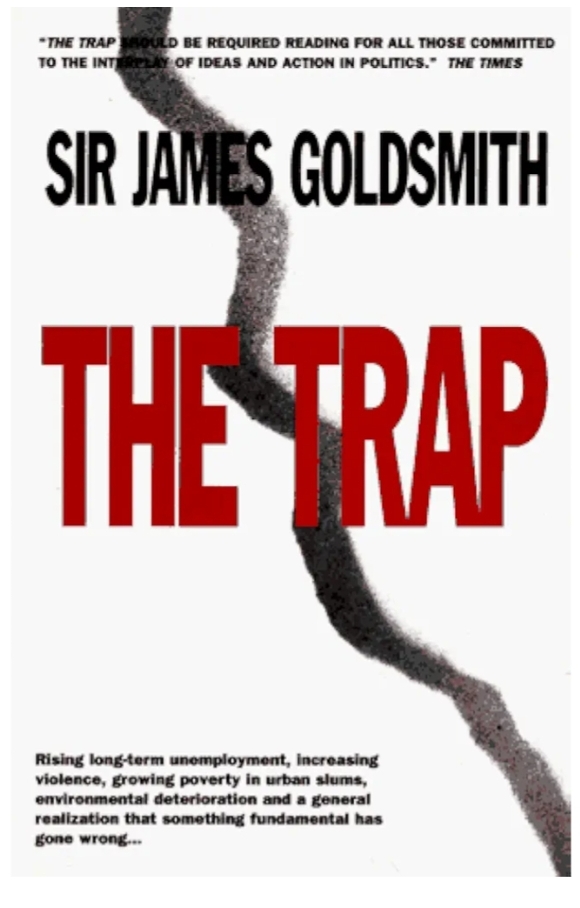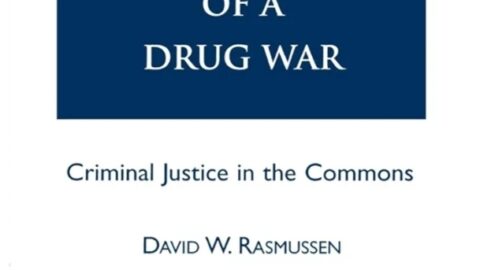Introduction
In his 1994 book, The Trap, Sir James Goldsmith, a Franco-British financier and politician, presented a critical analysis of globalization, particularly focusing on the implications of global free trade agreements like the General Agreement on Tariffs and Trade (GATT). Goldsmith argued that such agreements, while promising economic growth, would lead to the erosion of national sovereignty, the destabilization of developed economies, and the exploitation of developing nations. His warnings, initially dismissed by many, have gained renewed attention in light of contemporary global economic challenges.
Goldsmith’s Central Arguments
Global Free Trade and Economic Disruption Goldsmith contended that global free trade would allow multinational corporations to exploit cheap labor markets, leading to the outsourcing of jobs from developed countries. He warned that this would result in wage stagnation, unemployment, and the decline of the middle class in these nations. Simultaneously, he argued that developing countries would suffer environmental degradation and social upheaval as traditional industries and communities were disrupted.
Erosion of National Sovereignty He believed that supranational entities and trade agreements would undermine the ability of individual nations to govern themselves, particularly in economic matters. Goldsmith was especially critical of the European Union’s trajectory, viewing it as a move towards a centralized bureaucratic state that diminished democratic accountability.
Critique of Economic Metrics Goldsmith challenged the reliance on Gross National Product (GNP) as a measure of a nation’s well-being. He argued that GNP could increase even in the face of societal issues like crime and environmental disasters, thus failing to reflect the true health of a society.
Environmental Concerns He expressed deep concern over industrial agriculture and biotechnology, criticizing their impacts on health, biodiversity, and traditional farming practices. Goldsmith feared that such developments prioritized profit over ecological and human well-being.
Criticisms and Counterarguments
While Goldsmith’s critiques were comprehensive, they faced several counterarguments:
- Economic Growth and Poverty Reduction: Proponents of globalization argue that free trade has lifted millions out of poverty by providing access to larger markets and encouraging efficiency.
- Consumer Benefits: Globalization has led to a wider variety of goods at lower prices for consumers in developed countries.
- Innovation and Technology Transfer: Open markets facilitate the spread of technology and innovation, contributing to global development.
- Adaptability of Economies: Critics suggest that economies can adapt to globalization through education, retraining, and social safety nets to mitigate job displacement.
Contemporary Relevance
Decades after its publication, The Trap resonates with current global issues:
- Rise of Populism: Economic dislocation attributed to globalization has fueled populist movements worldwide, reflecting concerns Goldsmith highlighted.
- Supply Chain Vulnerabilities: Events like the COVID-19 pandemic have exposed the fragility of global supply chains, prompting reevaluations of trade dependencies.
- Environmental Degradation: The environmental impacts of industrial practices remain pressing, aligning with Goldsmith’s ecological warnings.
- Debates on Sovereignty: Discussions around national control over policies, especially in the context of international agreements, continue to be pertinent.
Conclusion
Sir James Goldsmith’s The Trap serves as a thought-provoking critique of globalization, emphasizing the need to balance economic integration with the preservation of national sovereignty, social stability, and environmental integrity. While some of his predictions have materialized, the debate over globalization’s merits and drawbacks persists, underscoring the complexity of managing interconnected global systems.






